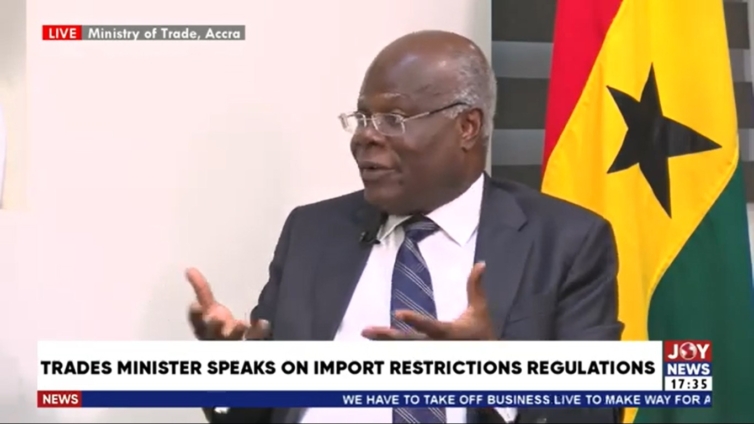The Trade and Industry Minister, K.T. Hammond, has assured the populace that the proposed Legislative Instrument (LI) on Export and Import, specifically focusing on the restriction of selected strategic products, will not lead to a shortage of food in the country.
In an interview on JoyNews' PM Express, Mr Hammond explained that the intention is not to completely ban the importation of products but rather implement some restrictions with a keen eye on maintaining equilibrium in the local food supply chain.
“We are not banning; we’re restricting, but it will be restricted to the extent that we don't create famine in the country,” he said on Monday, November 27.
To ensure a comprehensive approach, a committee comprising representatives from the Food and Agriculture Ministry, the Finance Ministry, the Ghana Revenue Authority, and the Food and Drugs Authority will be responsible for overseeing the monitoring process.
Mr Hammond stressed the importance of collaboration between the ministries, particularly highlighting the close liaison between the Trade and Industry Ministry and the Food and Agriculture Ministry in the formulation of the LI.
According to him, should Parliament pass the proposed legislation, the Food and Agriculture Ministry will have the responsibility to provide updates on domestic food production and collaborate with the Trade Ministry to identify essential commodities that may need to be imported.
“The committee through the Agriculture Ministry will tell us that the deficit between production and consumption in the country is this much, so this product is important and must be brought in. We would allow the importation to supplement our local food production so that there is no shortage of food locally,” he explained.
The Minister reiterated the government's commitment to preventing starvation and ensuring that the right quantity of essential products is allowed into the country.
He further explained that the goal is to strike a balance between supporting local production and maintaining an adequate supply of food.
“We would monitor as much as we can and make sure we balance the system because even though the government aims to preserve its foreign reserves, this vision will not be at the expense of people not being able to feed themselves,” he assured.
On Monday, Mr Hammond, laid before Parliament an improved version of the LI after it was blocked last week over the lack of quorum and consultation.
The LI will compel importers of 22 restricted items, including poultry, rice, sugar, diapers and animal intestines (Yemuadie) to seek licenses from a committee to be set up by the minister.
The Minority in Parliament has, on three occasions, resisted the laying of the LI on the ground that it was not only dangerous but violated international trade practices and could give too much power to the minister, a situation that has the propensity to breed corruption.
Latest Stories
-
ORAL: We won’t witch-hunt, we’ll focus on transparency, not revenge – Ablakwa
13 minutes -
Bawumia joins thousands in Kumasi for burial prayers for Ashanti Regional Imam
3 hours -
Blue Gold Bogoso Prestea Limited challenges government actions in court
3 hours -
Verdicts due for 51 men in Pelicot mass rape trial that shook France
4 hours -
Syria not a threat to world, rebel leader Ahmed al-Sharaa tells BBC
4 hours -
Patrick Atangana Fouda: ‘A hero of the fight against HIV leaves us’
4 hours -
Trinity Oil MD Gabriel Kumi elected Board Chairman of Chamber of Oil Marketing Companies
5 hours -
ORAL campaign key to NDC’s election victory – North America Dema Naa
5 hours -
US Supreme Court to hear TikTok challenge to potential ban
5 hours -
Amazon faces US strike threat ahead of Christmas
6 hours -
Jaguar Land Rover electric car whistleblower sacked
6 hours -
US makes third interest rate cut despite inflation risk
6 hours -
Fish processors call for intervention against illegal trawling activities
6 hours -
Ghana will take time to recover – Akorfa Edjeani
7 hours -
Boakye Agyarko urges reforms to revitalise NPP after election defeat
7 hours

